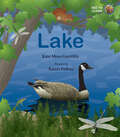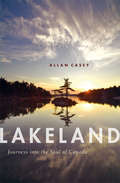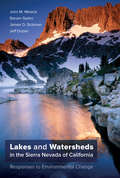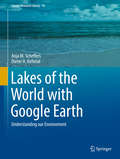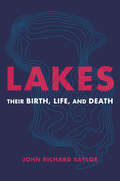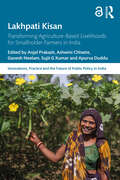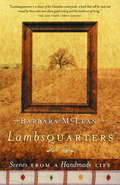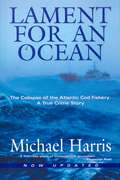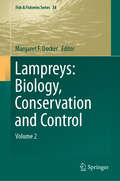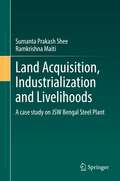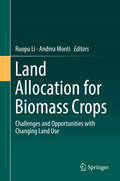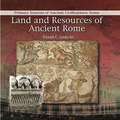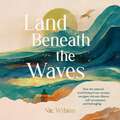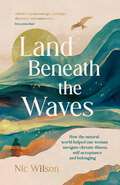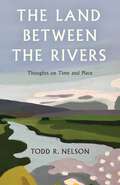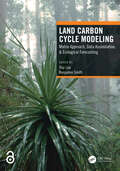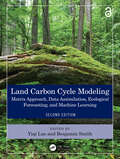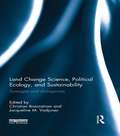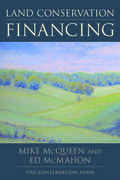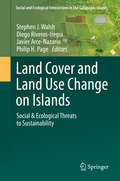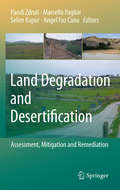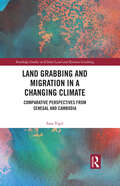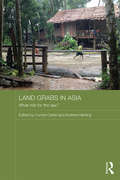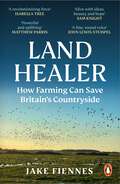- Table View
- List View
Lake: A See to Learn Book (See to Learn #2)
by Kate Moss GamblinLake: A See to Learn Book, the second book in the See to Learn series, is designed to inspire scientific curiosity, appreciation of beauty and connection to the natural world, through gentle questions and vibrant illustrations. Lake: A See to Learn Book is the second title in a series of non-fiction picture books for very young children that uses lyrical language to encourage a sensitive perception of the natural world and a caring connection with it. The text asks young readers to consider what they see and experience at a lake through the seasons — from dragonflies and hummingbirds in summer, to crimson leaves in fall, to goslings on the lake’s icy surface in winter, to moose calves by the water’s edge in spring — drawing local connections alongside those of a global sensibility. Gorgeous illustrations show a child and adult appreciating the lake’s beauty, learning its secrets and enjoying moments of wonder, all first steps toward developing a lifelong awareness of our interconnectedness to the Earth and our impact on the environment. Includes suggestions for further reading and an author’s note regarding aspects of shaping our inner environmental compass. Key Text Features author's note further reading Correlates to the Common Core State Standards in English Language Arts: CCSS.ELA-LITERACY.RL.1.4 Identify words and phrases in stories or poems that suggest feelings or appeal to the senses.
Lakeland
by Allan CaseyLakes define not only Canada's landscape but the national imagination. Blending writing on nature, travel, and science, award-winning journalist Allan Casey systematically explores how the country's history and culture originates at the lakeshore. Lakeland describes a series of interconnected journeys by the author, punctuated by the seasons and the personalities he meets along the way including aboriginal fishery managers, fruit growers, boat captains, cottagers, and scientists. Together they form an evocative portrait of these beloved bodies of water and what they mean, from sapphire tarns above the Rocky Mountain tree line to the ponds of western Newfoundland.
Lakes and Watersheds in the Sierra Nevada of California: Responses to Environmental Change (Freshwater Ecology Series #5)
by John M. MelackThe Sierra Nevada, California’s iconic mountain range, harbors thousands of remote high-elevations lakes from which water flows to sustain agriculture and cities. As climate and air quality in the region change, so do the watershed processes upon which these lakes depend. In order to understand the future of California’s ecology and natural resources, we need an integrated account of the environmental processes that underlie these aquatic systems. Synthesizing over three decades of research on the lakes and watersheds of the Sierra Nevada, this book develops an integrated account of the hydrological and biogeochemical systems that sustain them. With a focus on Emerald Lake in Sequoia National Park, the book marshals long-term limnological and ecological data to provide a detailed and synthetic account, while also highlighting the vulnerability of Sierra lakes to changes in climate and atmospheric deposition. In so doing, it lays the scientific foundations for predicting and understanding how the lakes and watersheds will respond.
Lakes of the World with Google Earth
by Anja M. Scheffers Dieter H. KelletatFeaturing satellite imagery from Google Earth, this guide provides a unique, highly visual tour of lakes across the globe, from the simple to the complex, the nearby to the remote. Clear text accompanies each image and identifies important aspects of each lake along with such information as its coordinates, scale, and altitudes, if relevant. From the many aspects of lake science including water budgets, temperature regimes, mixing types, biology/ecology, and chemistry, the book concentrates on the genesis of lakes and other closed forms containing water, moisture/swamps or minerals. Its organisation follows different forms of lake origin (often connected to the question of age) such as extra-terrestrial meteor impacts, structural depressions by tectonic activity, patterning of joints or faults, volcanic origin, or the forming influence of glacier ice, subterranean permafrost, littoral processes, running water, wind, and solution of rocks (karst forms). Coverage also deals with temporal variations in lake existence within the context of climate change in the past and the future. In addition, special chapters are devoted to saline (or salt) lakes, and -- in their evaporated forms -- to saltpans. Providing essential information at a glance, this guide will be help both specialists and general readers better understand the world's lakes as well as see them in a new perspective.
Lakes: Their Birth, Life, and Death
by John Richard Saylor&“Lakes is my favorite kind of natural history: meticulously researched, timely, comprehensive, and written with imagination and verve.&”—Jerry Dennis, author of The Living Great Lakes Lakes might be the most misunderstood bodies of water on earth. And while they may seem commonplace, without lakes our world would never be the same. In this revealing look at these lifegiving treasures, John Richard Saylor shows us just how deep our connection to still waters run. Lakes is an illuminating tour through the most fascinating lakes around the world. Whether it&’s Lake Vostok, located more than two miles beneath the surface of Antarctica, whose water was last exposed to the atmosphere perhaps a million years ago; Lake Baikal in southern Siberia, the world&’s deepest and oldest lake formed by a rift in the earth&’s crust; or Lake Nyos, the so-called Killer Lake that exploded in 1986, resulting in hundreds of deaths, Saylor reveals to us the wonder that exists in lakes found throughout the world. Along the way we learn all the many forms that lakes take—how they come to be and how they feed and support ecosystems—and what happens when lakes vanish.
Lakhpati Kisan: Transforming Agriculture-Based Livelihoods for Smallholder Farmers in India (Public Policy in India)
by Anjal Prakash, Ashwini Chhatre, Ganesh Neelam, Sujit G Kumar and Apurva DudduAgriculture plays an essential role in the growth of developing economies, as agricultural production is key to food security and is closely intertwined with the livelihoods of many. This book explores the lives of smallholder agricultural farmers in India and the dire challenges that agricultural households face.Focussing on the Lakhpati Farmers initiative, the book examines interventions made by the programme to economically empower farmers and accelerate income growth in the agriculture sector. The programme, initiated by the Collectives for Integrated Livelihood Initiatives (CInI) in the tribal belts of central Indian states, helped farmers earn over INR 100,000 (or one lakh – hence Lakhpati) per annum. The programme engaged with households in 12 districts across 4 states – Jharkhand, Odisha, Maharashtra, and Gujarat – to bring about change through economic empowerment and improve the quality of life of tribal communities. This book documents these initiatives and strategies to meet the aspirations of small and marginal farmers by understanding the ingredients, processes, and challenges involved. The book analyses the programme, examines case studies, and offers ways forward.Part of the Innovations, Practice and the Future of Public Policy in India series, this volume will interest students and researchers of agriculture and rural development, business management, governance, public policy, development studies, and sociology.This book is freely available as a downloadable Open Access PDF at http://www.taylorfrancis.com under a Creative Commons (CC-BY-NC-ND) 4.0 license.
Lambsquarters: Scenes from a Handmade Life
by Barbara McleanAt the age of twenty-four, Barbara McLean and her husband, Thomas, decided to make their home in the country, near a village called Alderney in Grey County, Ontario. Together they became homeowners, farmers and, eventually, parents. They called their farm Lambsquarters, and they remain there today, twenty-six years later. Life on a farm is a cycle of never-ending work and discovery. Barbara and her family develop close relationships with every living thing: the hearty lambs and the fragile ones, the pumpkins and the potatoes and the hollyhocks in the barnyard, a family of bluebirds with problems of its own. What at first seems an intensely independent act -- having one's own land and space -- becomes more meaningful once it becomes possible to connect with the larger community. Strong bonds are formed with neighbours who share both in grief and in celebration.In striking portraits that are intensely intimate and yet reverberate with the universal hum of life, Barbara McLean describes the beauty, pain and wonder of the very essence of her surroundings and all who share them. We accompany her on a life's journey, from a somewhat daunted dweller of a ramshackle farmhouse to a true inhabitant of a place. Lambsquarters is for everyone who has dreamed of reconnecting with the land, as well as for those already well acquainted with rubber boots, chicken manure and the long trajectories of the rural school bus.
Lament for an Ocean: The Collapse of the Atlantic Cod Fishery
by Michael HarrisThe northern cod have been almost wiped out. Once the most plentiful fish on the Grand Banks off the coast of Newfoundland, the cod is now on the brink of extinction, and tens of thousands of people in Atlantic Canada have been left without work by a 1992 moratorium on fishing the stock. Today, the Pacific salmon stocks are in similar trouble – victims of the same blind, stupid greed. Angry, accusatory fingers have been pointed at various possible culprits for the collapse of the cod – at the Spanish and Portuguese, who for hundreds of years sent ever-bigger fleets to the Grand Banks; at the factory-freezer trawlers, which “vacuumed” the ocean floor for the prized fish; at those inshore fishermen who circumvented the rules governing the fishery; at the federal Department of Fisheries and Oceans, which is responsible for managing the fishery; at the harp seal, the cod’s competitor for food, whose numbers have exploded in recent years; even at Nature, for lowering the temperature of the ocean. InLament for an Ocean,the award-winning true-crime writer Michael Harris investigates the real causes of the most wanton destruction of a natural resource in North American history since the buffalo were wiped off the face of the prairies. The story he carefully unfolds is the sorry tale of how, despite the repeated and urgent warnings of ocean scientists, the northern cod was ruthlessly exploited.
Lampreys: Volume 2 (Fish & Fisheries Series #38)
by Margaret F. DockerThis book, published in two volumes, provides the most comprehensive review of lamprey biology since Hardisty and Potter’s “The Biology of Lampreys” published more than 30 years ago. This second volume offers a synthesis of topics related to the lamprey gonad (e.g., lamprey sex ratios, sex determination and sex differentiation, sexual maturation, and sex steroids), the artifical propagation of lampreys, post-metamorphic feeding and the evolution of alternative feeding and migratory types, the history and status of sea lamprey control in the Laurentian Great Lakes and Lake Champlain, and an overview of contributions of lamprey developmental studies for understanding vertebrate evolution.
Lana's World: Let's Have A Parade! (Green Light Readers)
by Erica Silverman Jess Jess GoldenUnable to interest her parents, her brothers, or even her dog in having a parade in the rain, Lana lines up her toys in the hallway and is soon leading the parade of her dreams.
Land Acquisition, Industrialization and Livelihoods: A case study on JSW Bengal Steel Plant
by Ramkrishna Maiti Sumanta Prakash SheeThis book provides an assessment of the impacts of human intervention on the natural environment and peoples' livelihoods through land-use conversion due to industrialization. Problems of land acquisition and the execution thereof have varying consequences that depend on the specific geographical as well as socio-political contexts in which they occur. This book covers a specific study of JSW Bengal Steel Ltd., which in 2014 planned to set up a 10.0 million ton per year integrated steel plant at the upper catchment of Sundra basin, the tributary of the Shilabati that ultimately pours to the river Rupnarayan, located at Salboni Block of Paschim Medinipur, West Bengal, India. The project was ultimately put on hold, but caused many lingering environmental and socioeconomic problems due to the acquisition of formerly productive lands. The book examines this case to generate a database on the different aspects of land acquisition and its negative impacts on the geomorphology and hydrological of non-timber forest products, agricultural impacts resulting in livelihood changes, policy dimensions of land acquisition, and the impacts of delays in project implementation through a comparative analysis between projects-affected areas and non-project areas. The book will appeal to environmental managers and industry workers, as well as students and researchers in environmental economics, anthropology, and human geography.
Land Allocation for Biomass Crops: Challenges and Opportunities with Changing Land Use
by Andrea Monti Ruopu LiThis edited volume establishes a forum for international experts to explore cutting-edge questions associated with the land use and biomass production. Topics include ‘do we have enough land, either primary or marginal, to accommodate future production of biomass?’, ‘how are farming decisions made in response to biomass incentives?’, ‘is the current bio-mass production socially, economically and environmentally sustainable?’, and ‘what are the main constraints currently limiting biofuel deployment?’ The expansion of biomass production is often at the cost of reduced land availability for food production and losses of areas with ecological functions such as forests and wetlands. This process often involves complex interplay of physical dynamics and human systems that are driven by numerous geographic and socio-economic factors at different scales. Thus, the state-of-the-art research on the land use issues surrounding the biomass production and its environmental impacts is important for informed land management decision making. This book will be of great use to researchers in land use management and biomass-based renewable energy, as well as practitioners.
Land And Resources In Ancient Rome (Primary Sources Of Ancient Civilizations Series)
by Daniel C. GedachtAncient Roman civilization has long been studied to discover what propelled this society to such great heights and to learn why it fell. Primary source imagery, artifacts, and interesting, kid-friendly text will keep students engaged as they learn about an ancient world cultures--an important part of the curriculum.
Land Beneath the Waves: How the Natural World Helped One Woman Navigate Chronic Illness, Self-Acceptance and Belonging
by Nic WilsonA moving, honest and revealing memoir of living with chronic illness, and an examination of the ways a relationship with the natural world can affect us, from debut author and nature writer Nic WilsonWhen Nic Wilson begins researching the history of her local landscape and its wildlife, the last thing she wants to do is consider her own past. But as she unearths tales of giant sequoias, puss moths, nightingales and chalk streams, Nic realizes her affinity with the nearby wild began as a way to handle growing up with a mother who lived with a debilitating chronic illness.Now in her forties, and struggling with mental and physical health herself, Nic revisits her childhood to trace the influence of the natural world on her life. As she grapples with revelations from the past, the boundaries between self and land become increasingly porous, and the lure of the wetlands around her home threatens to engulf her. Can she find the strength to face the waves of chronic illness - past and present - and learn to reach for steady ground?With the natural world facing more threats than ever before, Land Beneath the Waves inspires us to develop a meaningful bond with our local natural spaces and landscapes, illuminating a hopeful path towards a better future for human and non-human life.
Land Beneath the Waves: How the Natural World Helped One Woman Navigate Chronic Illness, Self-Acceptance and Belonging
by Nic WilsonA moving, honest and revealing memoir of living with chronic illness, and an examination of the ways a relationship with the natural world can affect us, from debut author and nature writer Nic Wilson. Can Nic find the strength to face up to chronic illness in the past and present, and learn how to reach out for help?
Land Between the Rivers: Thoughts on Time and Place
by Todd R. NelsonTodd Nelson, a retired educator, builds upon the success of his critically acclaimed debut essay collection, Cold Spelll. In this new compilation, Nelson delves into his Maine experiences, weaving together a series of concise essays. Unlike the traditional focus on specific locations, these essays center around the art of observation. While readers will recognize the Maine setting, the precise locales remain intentionally elusive. The Land Between the Rivers invites readers to explore the act of seeing, fostering a deeper connection with place, language, and storytelling. It encourages us to peer beyond mere appearances and engage in the realm of imagination.
Land Carbon Cycle Modeling: Matrix Approach, Data Assimilation, & Ecological Forecasting
by Benjamin Smith Yiqi LuoCarbon moves through the atmosphere, through the oceans, onto land, and into ecosystems. This cycling has a large effect on climate – changing geographic patterns of rainfall and the frequency of extreme weather – and is altered as the use of fossil fuels adds carbon to the cycle. The dynamics of this global carbon cycling are largely predicted over broad spatial scales and long periods of time by Earth system models. This book addresses the crucial question of how to assess, evaluate, and estimate the potential impact of the additional carbon to the land carbon cycle. The contributors describe a set of new approaches to land carbon cycle modeling for better exploring ecological questions regarding changes in carbon cycling; employing data assimilation techniques for model improvement; and doing real- or near-time ecological forecasting for decision support. This book strives to balance theoretical considerations, technical details, and applications of ecosystem modeling for research, assessment, and crucial decision making. Key Features Helps readers understand, implement, and criticize land carbon cycle models Offers a new theoretical framework to understand transient dynamics of land carbon cycle Describes a suite of modeling skills – matrix approach to represent land carbon, nitrogen, and phosphorus cycles; data assimilation and machine learning to improve parameterization; and workflow systems to facilitate ecological forecasting Introduces a new set of techniques, such as semi-analytic spin-up (SASU), unified diagnostic system with a 1-3-5 scheme, traceability analysis, and benchmark analysis, for model evaluation and improvement Related Titles Isabel Ferrera, ed. Climate Change and the Oceanic Carbon Cycle: Variables and Consequences (ISBN 978-1-774-63669-5) Lal, R. et al., eds. Soil Processes and the Carbon Cycle (ISBN 978-0-8493-7441-8) Windham-Myers, L., et al., eds. A Blue Carbon Primer: The State of Coastal Wetland Carbon Science, Practice and Policy (ISBN 978-0-367-89352-1)
Land Carbon Cycle Modeling: Matrix Approach, Data Assimilation, Ecological Forecasting, and Machine Learning
by Benjamin Smith Yiqi LuoCarbon moves through the atmosphere, through the oceans, onto land, and into ecosystems. This cycling has a large effect on climate – changing geographic patterns of rainfall and the frequency of extreme weather – and is altered as the use of fossil fuels adds carbon to the cycle. The dynamics of this global carbon cycling are largely predicted over broad spatial scales and long periods of time by Earth system models. This book addresses the crucial question of how to assess, evaluate, and estimate the potential impact of the additional carbon to the land carbon cycle. The contributors describe a set of new approaches to land carbon cycle modeling for better exploring ecological questions regarding changes in carbon cycling; employing data assimilation techniques for model improvement; doing real- or near-time ecological forecasting for decision support; and combining newly available machine learning techniques with process-based models to improve prediction of the land carbon cycle under climate change. This new edition includes seven new chapters: machine learning and its applications to carbon cycle research (five chapters); principles underlying carbon dioxide removal from the atmosphere, contemporary active research and management issues (one chapter); and community infrastructure for ecological forecasting (one chapter).Key Features Helps readers understand, implement, and criticize land carbon cycle models Offers a new theoretical framework to understand transient dynamics of the land carbon cycle Describes a suite of modeling skills – matrix approach to represent land carbon, nitrogen, and phosphorus cycles; data assimilation and machine learning to improve parameterization; and workflow systems to facilitate ecological forecasting Introduces a new set of techniques, such as semi-analytic spin-up (SASU), unified diagnostic system with a 1-3-5 scheme, traceability analysis, and benchmark analysis, and PROcess-guided machine learning and DAta-driven modeling (PRODA) for model evaluation and improvement Reorganized from the first edition with seven new chapters added Strives to balance theoretical considerations, technical details, and applications of ecosystem modeling for research, assessment, and crucial decision-making
Land Change Science, Political Ecology, and Sustainability: Synergies and divergences
by Christian Brannstrom Jacqueline M. VadjunecRecent claims regarding convergence and divergence between land change science and political ecology as approaches to the study of human-environment relationships and sustainability science are examined and analyzed in this innovative volume. Comprised of 11 commissioned chapters as well as introductory and concluding/synthesis chapters, it advances the two fields by proposing new conceptual and methodological approaches toward integrating land change science and political ecology. The book also identifies areas of fundamental difference and disagreement between fields. These theoretical contributions will help a generation of young researchers refine their research approaches and will advance a debate among established scholars in geography, land-use studies, and sustainability science that has been developing since the early 2000s. At an empirical level, case studies focusing on sustainable development are included from Africa, Central and South America, and Southeast Asia. The specific topics addressed include tropical deforestation, swidden agriculture, mangrove forests, gender, and household issues.
Land Conservation Financing
by Edward T. Mcmahon The Conservation Fund Mike McqueenWritten by two of the nation's leading experts on land conservation, Land Conservation Financing provides a comprehensive overview of successful land conservation programs -- how they were created, how they are funded, and what they've accomplished -- along with detailed case studies from across the United States.The authors present important new information on state-of-the-art conservation financing, showcasing programs in states that have become the nation's leaders in open-space protection: California, Colorado, Florida, Illinois, Maryland, Massachusetts, Minnesota, and New Jersey. They look at key local land protection efforts by examining model programs in DeKalb County, Georgia; Douglas County, Colorado; Jacksonville, Florida; Lake County, Illinois; Lancaster County, Pennsylvania; Marin County, California; the St. Louis metro area in Missouri and Illinois, and on Cape Cod, Massachusetts.The authors then examine how hundreds of communities have created hundreds of millions of dollars in funding by developing successful campaigns to win land conservation ballot measures. They offer case studies and pull together lessons learned as they lay out how to run a successful campaign. The authors also consider the role of private foundations, which have made immense contributions to land conservation over the past two decades.The book concludes with an examination of the emerging concept of green infrastructure -- a strategic approach to conservation that involves planning and managing a network of parks, natural areas, greenways, and working lands that can help support native species, maintain ecological processes, and contribute to the health and quality of life for America's people and its communities.Land Conservation Financing is an indispensable resource for land conservationists in the public and private sectors who are looking for a detailed, national portrait of the state of land conservation in America today.
Land Cover and Land Use Change on Islands: Social & Ecological Threats to Sustainability (Social and Ecological Interactions in the Galapagos Islands)
by Stephen J. Walsh Philip H. Page Diego Riveros-Iregui Javier Arce-NazarioGlobalization is not a new phenomenon, but it is posing new challenges to humans and natural ecosystems in the 21st century. From climate change to increasingly mobile human populations to the global economy, the relationship between humans and their environment is being modified in ways that will have long-term impacts on ecological health, biodiversity, ecosystem goods and services, population vulnerability, and sustainability. These changes and challenges are perhaps nowhere more evident than in island ecosystems. Buffeted by rising ocean temperatures, extreme weather events, sea-level rise, climate change, tourism, population migration, invasive species, and resource limitations, islands represent both the greatest vulnerability to globalization and also the greatest scientific opportunity to study the significance of global changes on ecosystem processes, human-environment interactions, conservation, environmental policy, and island sustainability.In this book, we study islands through the lens of Land Cover/Land Use Change (LCLUC) and the multi-scale and multi-thematic drivers of change. In addition to assessing the key processes that shape and re-shape island ecosystems and their land cover/land use changes, the book highlights measurement and assessment methods to characterize patterns and trajectories of change and models to examine the social-ecological drivers of change on islands. For instance, chapters report on the results of a meta-analysis to examine trends in published literature on islands, a satellite image time-series to track changes in urbanization, social surveys to support household analyses, field sampling to represent the state of resources and their limitations on islands, and dynamic systems models to link socio-economic data to LCLUC patterns. The authors report on a diversity of islands, conditions, and circumstances that affect LCLUC patterns and processes, often informed through perspectives rooted, for instance, in conservation, demography, ecology, economics, geography, policy, and sociology.
Land Degradation and Desertification: Assessment, Mitigation and Remediation
by Selim Kapur Angel Faz Cano Marcello Pagliai Pandi ZdruliLand Degradation and Desertification: Assessment, Mitigation, and Remediation reports research results in sustainable land management and land degradation status and mitigation in 36 countries around the world. It includes background papers with continental and international perspectives dealing with land degradation and desertification studies. The book assembles various topics of interest for a large audience. They include carbon sequestration and stocks, modern techniques to trace the trends of land degradation, traditional and modern approaches of resource-base conservation, soil fertility management, reforestation, rangeland rehabilitation, land use planning, GIS techniques in desertification risk cartography, participatory ecosystem management, policy analyses and possible plans for action. Various climatic domains in Africa, Asia, Europe and The Americas are covered. The book will be of interest to a variety of environmental scientists, agronomists, national and international policy makers and a number of organizations dealing with sustainable management of natural resources.
Land Grabbing and Migration in a Changing Climate: Comparative Perspectives from Senegal and Cambodia (Routledge Studies in Global Land and Resource Grabbing)
by Sara VigilThis book provides a theoretical and empirical examination of the links between environmental change, land grabbing, and migration, drawing on research conducted in Senegal and Cambodia. While the impacts of environmental change on migration and of environmental discourses on land grabs have received increased attention, the role of both environmental and migration narratives in shaping migration by modifying access to natural resources has remained under-explored. Using a variegated geopolitical ecology framework and a comparative global ethnographic approach, this book analyses the power of mainstream adaptation and security frameworks and how they impact the lives of marginalised and vulnerable communities in Senegal and Cambodia. Findings across the cases show how environmental and migration narratives, linked to adaptation and security discourses, have been deployed advertently or inadvertently to justify land capture, leading to interventions that often increase, rather than alleviate, the very pressures that they intend to address. The interrelations between these issues are inherent to the tensions that exist, in different contexts and at different times, between capital accumulation and political legitimation. The findings of the book point to the urgency for researchers and policymakers to address the structural causes, and not the symptoms, of both environmental destruction and forced migration. It shows how acting upon environmental change, land grabs, and migration in isolated or binary manners can increase, rather than alleviate, pressures on those most socio-environmentally vulnerable. This book will be of interest to students, scholars, and practitioners working on the topics of land and resource grabbing and environmental change and migration. The book will also be of interest to those analysing political ecology transitions in Africa and Asia, as well as to those interested in novel theoretical and methodological frameworks.
Land Grabs in Asia: What Role for the Law? (Routledge Contemporary Asia Series)
by Connie Carter Andrew HardingAlthough there is no universally accepted definition of the term "land grabbing", ordinary people whose livelihoods are adversely affected by land grabbing know exactly what it is. It involves the physical capture and control of land and homes, including the usurpation of the power to decide how and when these will be used and for what purposes – with little or no prior consultation or compensation to the displaced communities. This thought-provoking book defines land grabbing, and examines aspects of the land grabs phenomenon in seven Asian countries, researched and written by country-specific legal scholars. The book provides unique perspectives on how and why land grabbing is practised in China, India, Pakistan, Cambodia, Malaysia, Myanmar and Indonesia, and explores the surprising role that law plays in facilitating and legitimizing land grabs in each country. In contrast to most of the literature which law focuses on foreign investors’ rights under international law, here the focus is on domestic laws and legal infrastructures. Finding that Asian States need to move beyond existing regimes that govern land to a regime that encourages more equitable land rights allocation and protection of stakeholders’ rights, the book urges further research in the nexus between the use of law to facilitate development. Land Grabs in Asia is the first book to explore land grabbing in multiple jurisdictions in Asia. As such, it will appeal to students and scholars of law and development, law and society, and international relations, as well as being essential reading for development policy-makers and government ministers.
Land Healer: How Farming Can Save Britain’s Countryside
by Jake Fiennes'Jake Fiennes is changing the face of farming in Britain... a revolutionising force' Isabella TreeOur relationship with our land is broken: we must heal it.Jake Fiennes is on a mission to change the face of the English countryside. As Conservation Manager at Holkham in Norfolk, one of the country's largest historic country estates, his radical habitat restoration and agricultural work has nurtured its species and risen its crop yields - bringing back wetlands, hedgerows, birds and butterflies over 25,000 acres of land.But this isn't rewilding - there is no 'wild' in Britain anymore. Mass farming, crop science and industrial chemicals have destroyed the majority of our natural landscape and wildlife over the last century. Land Healer is the story of Fiennes's ambition to bring back our flora and fauna - by reclaiming our traditions and trialling new experiments which could restore our symbiosis with our land, and save our shared future.Following the farming year and the natural cycle of the seasons, Land Healer chronicles a life of conservation lived at the edges, and is a manifesto for rethinking our relationship with the natural world before it's too late.
